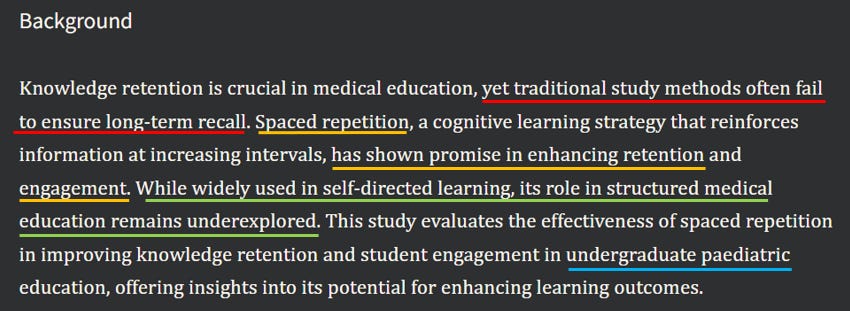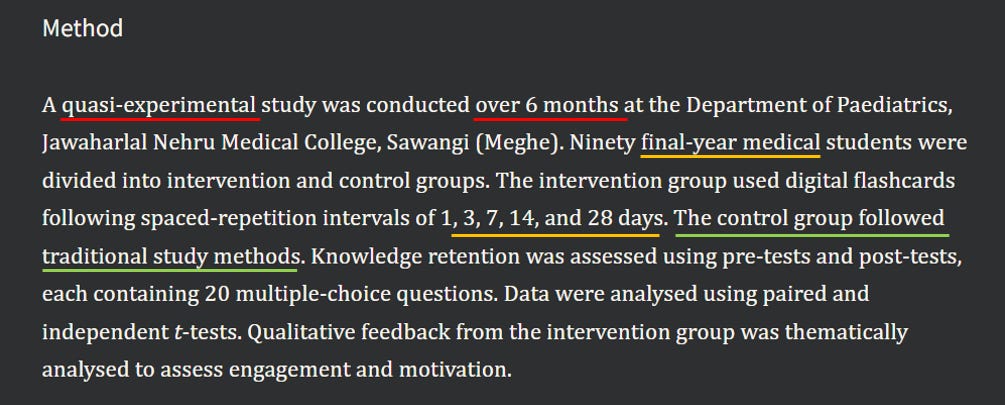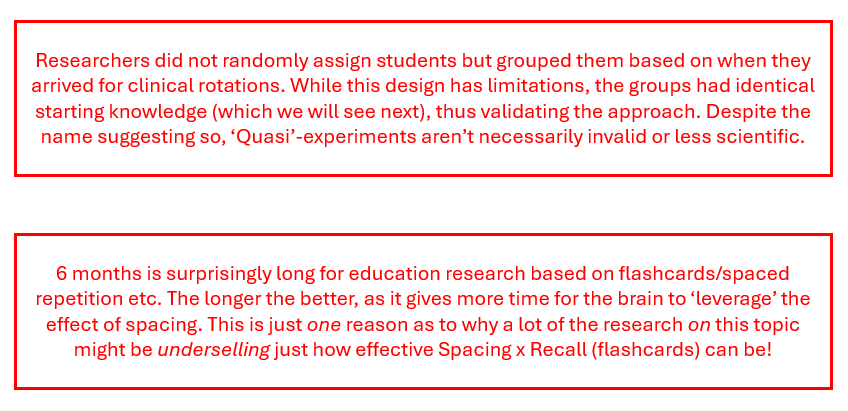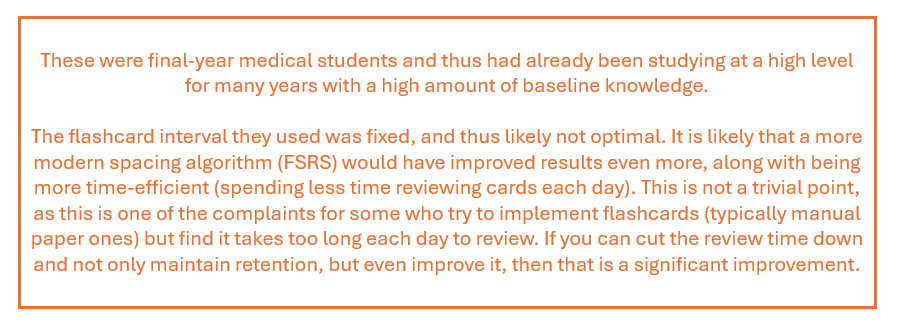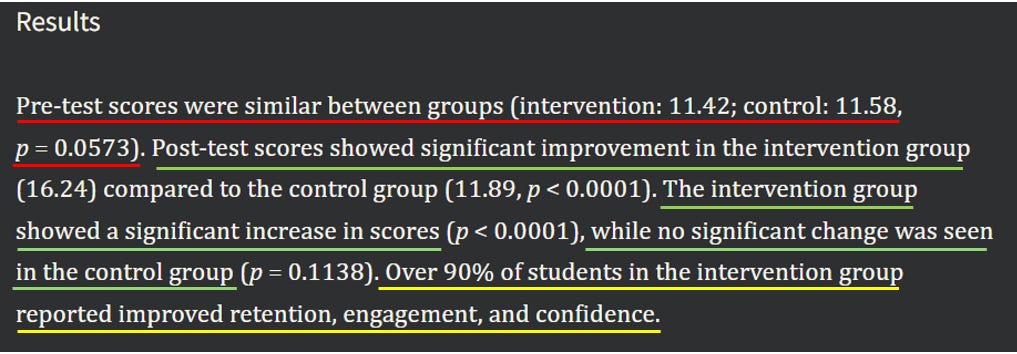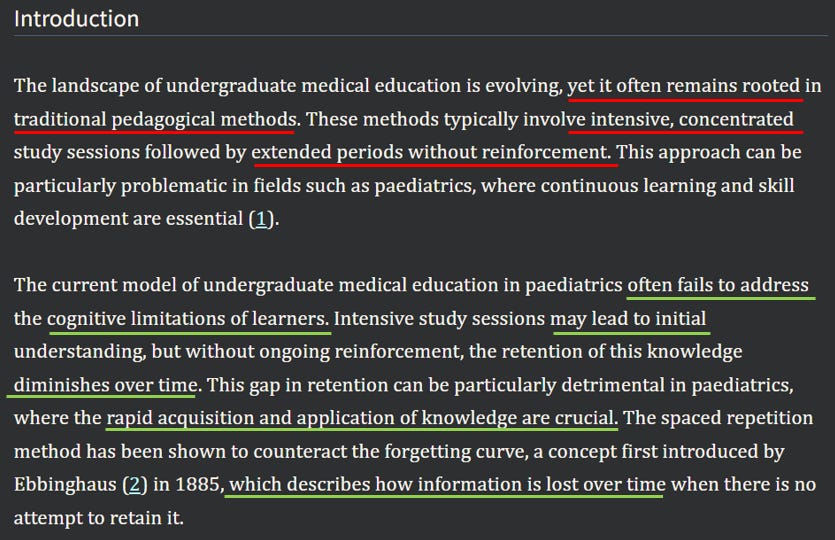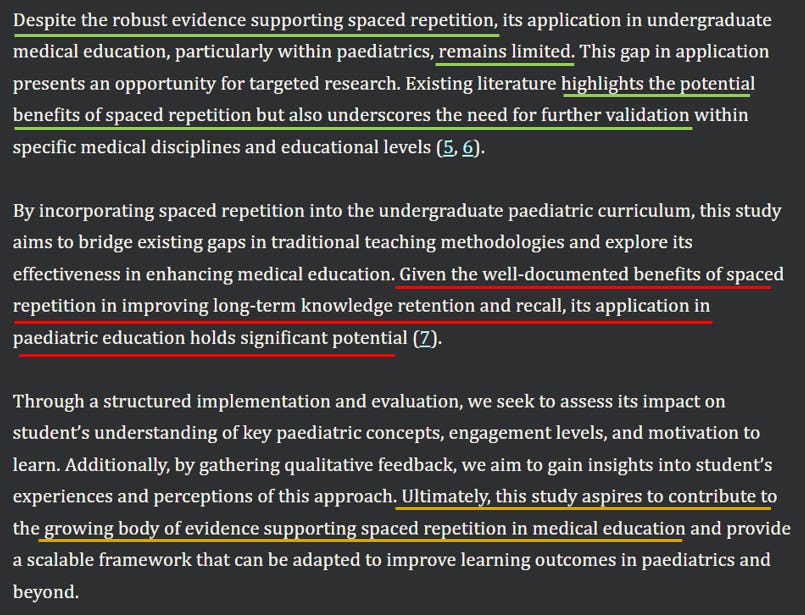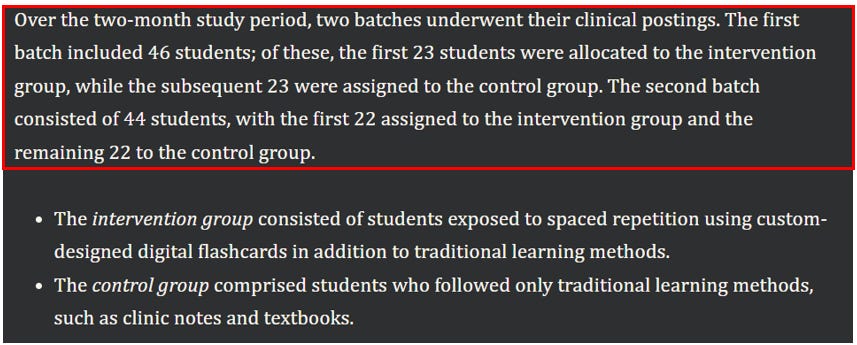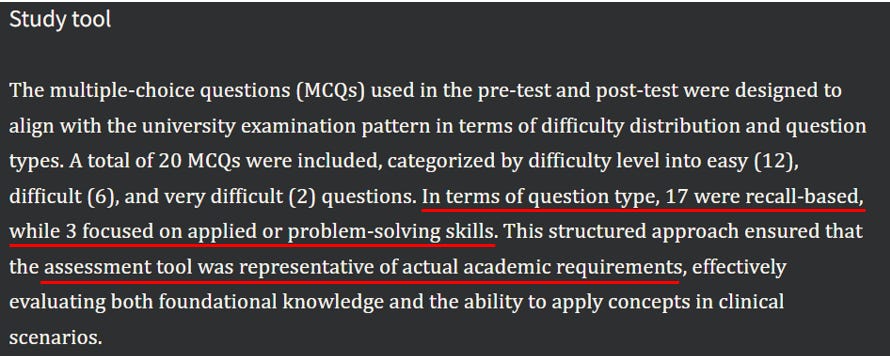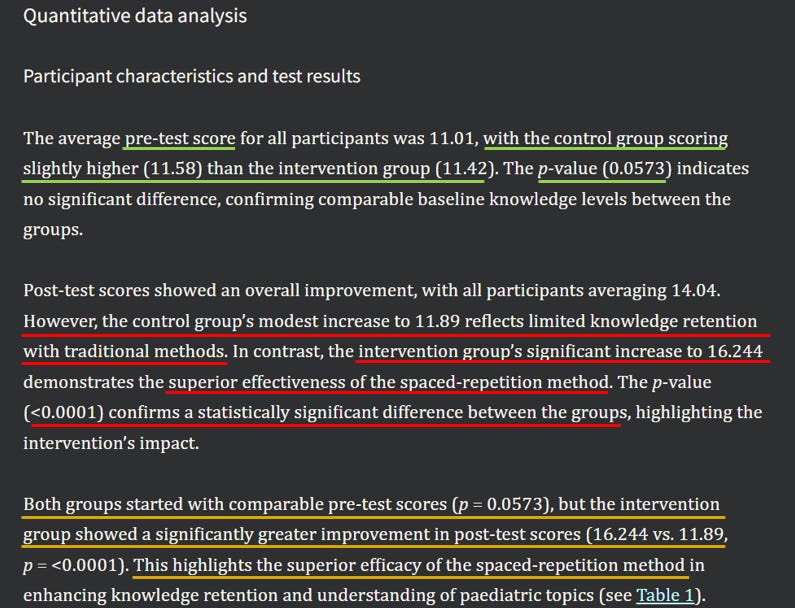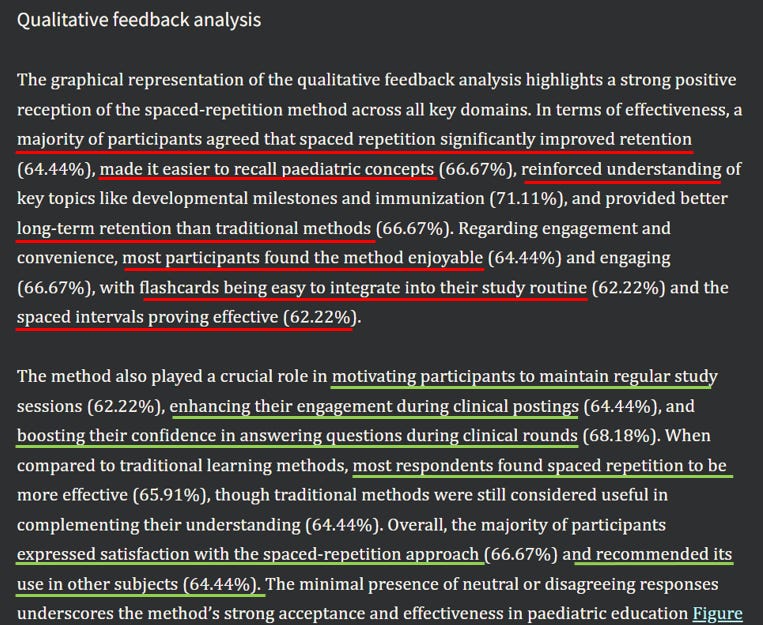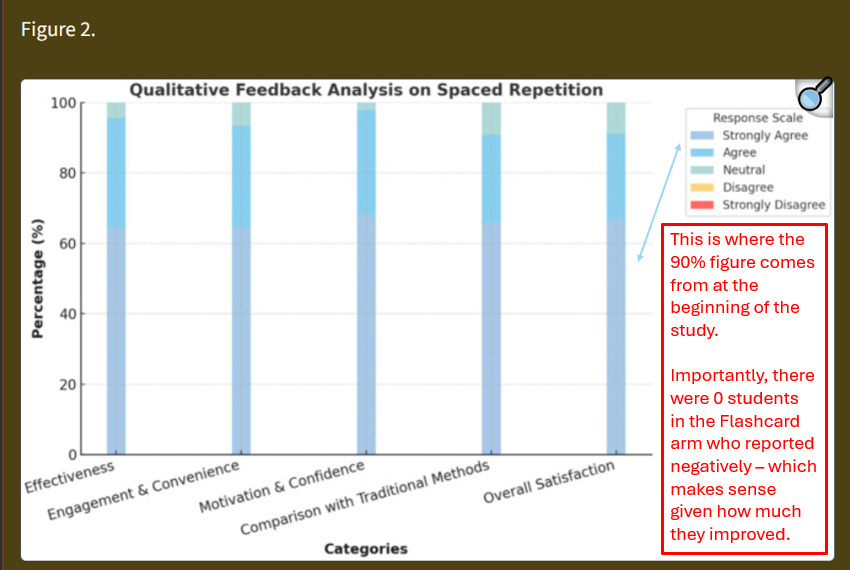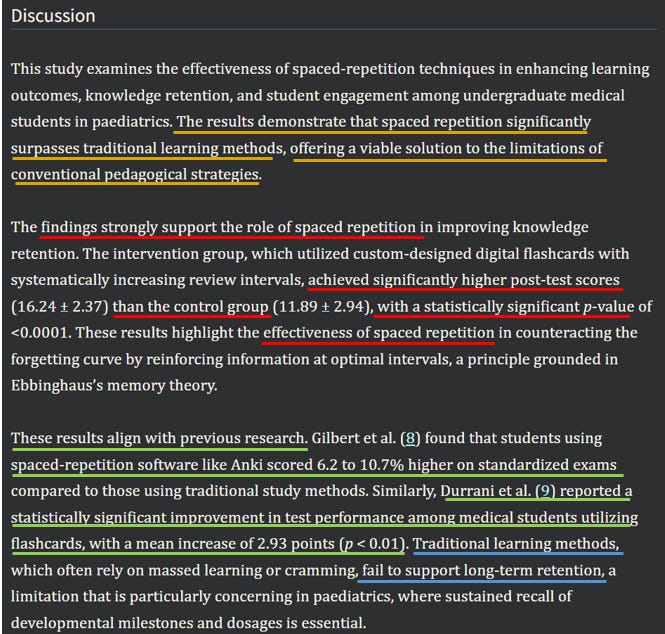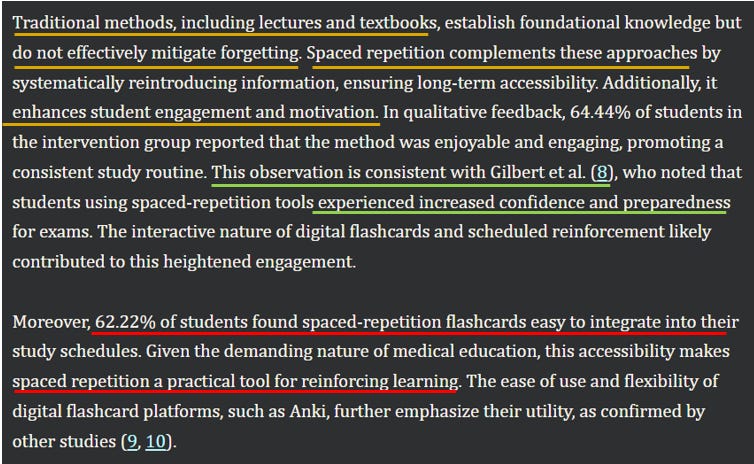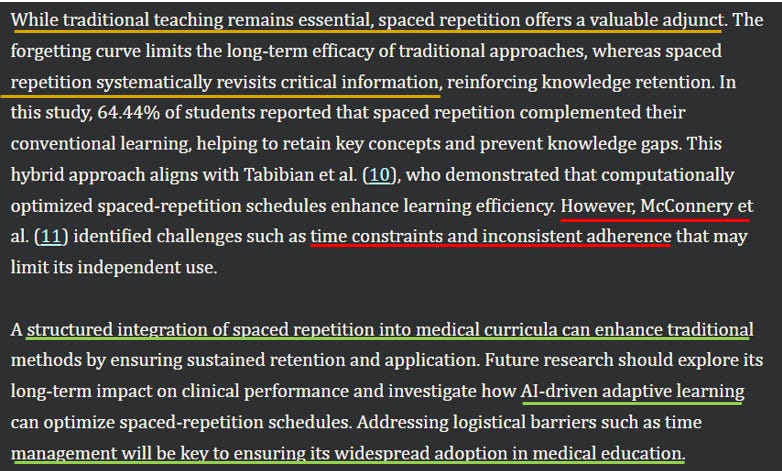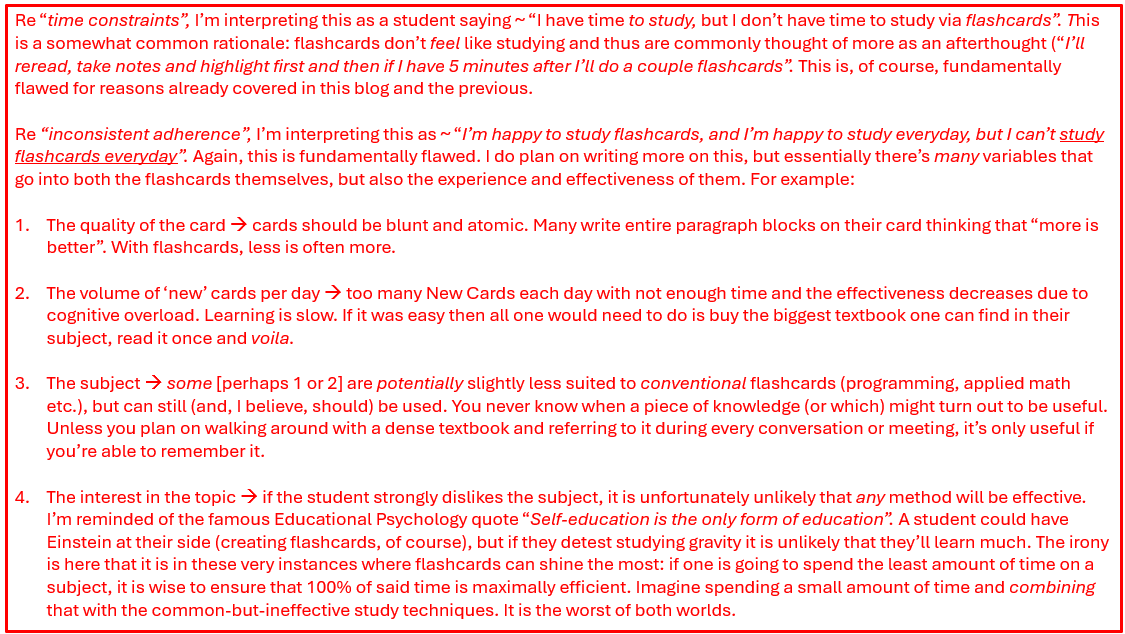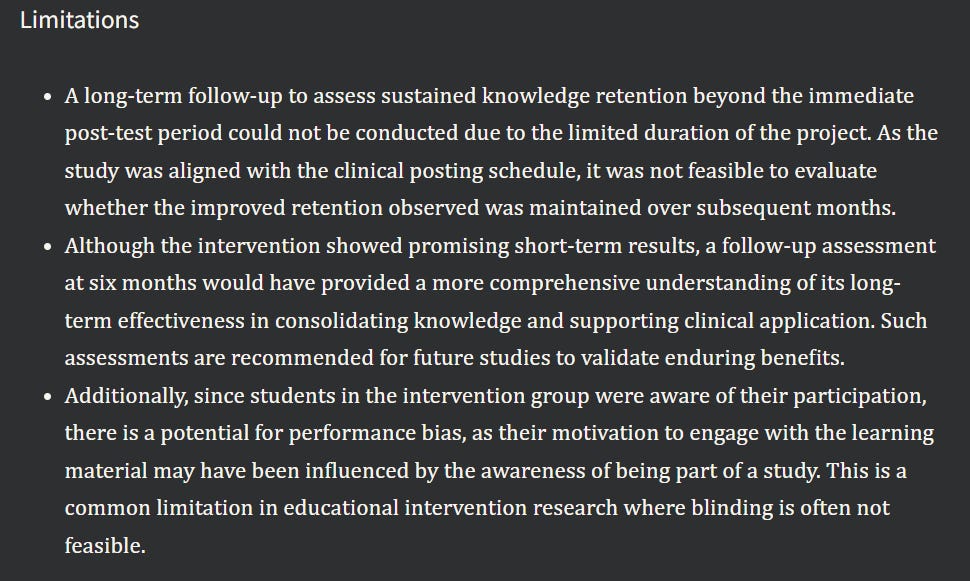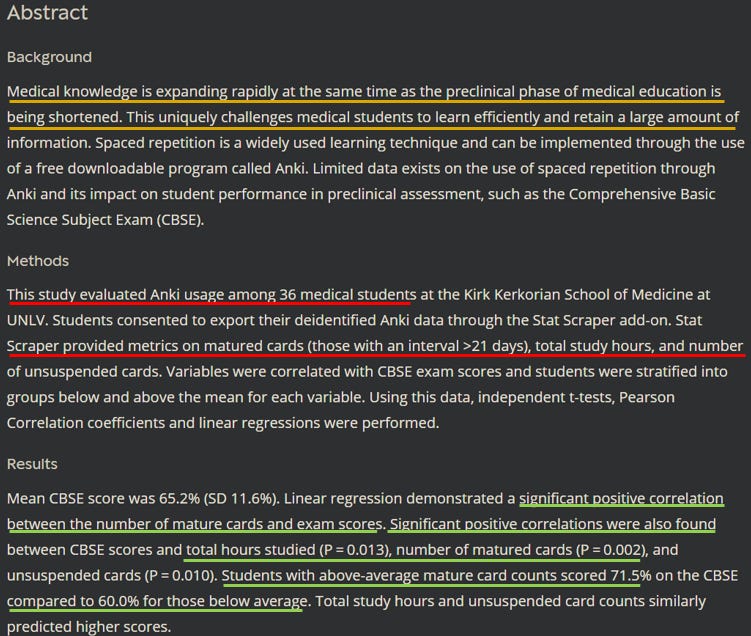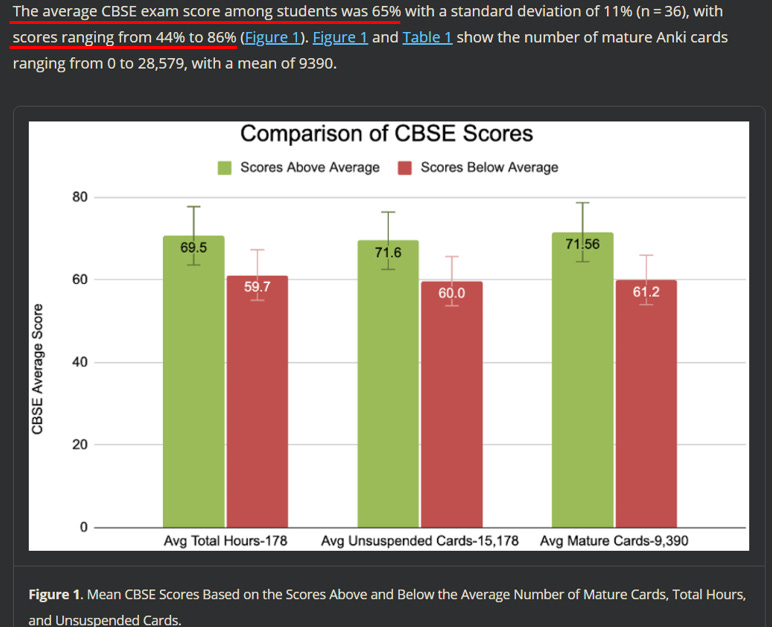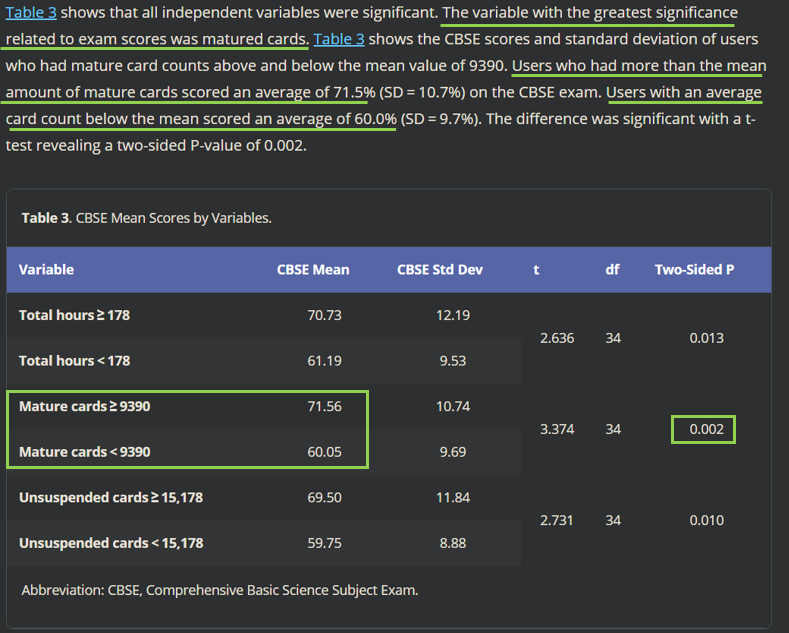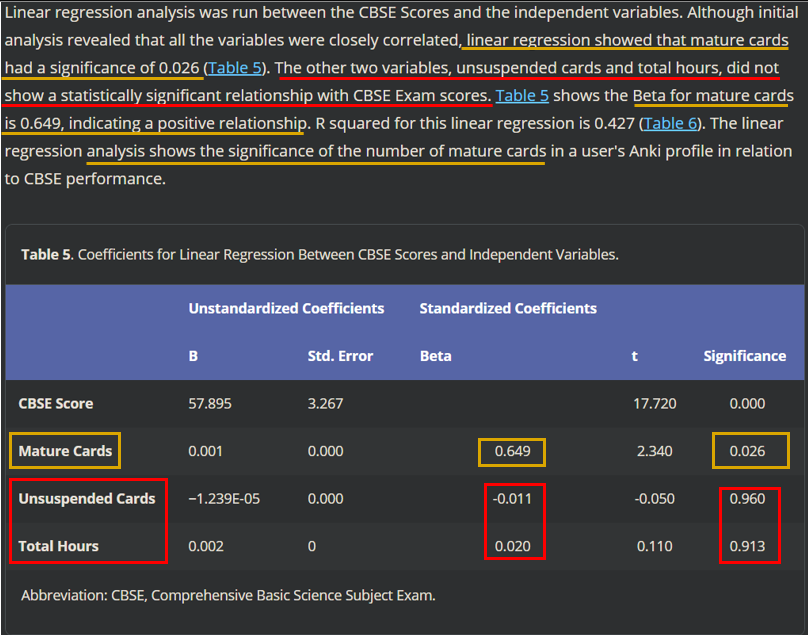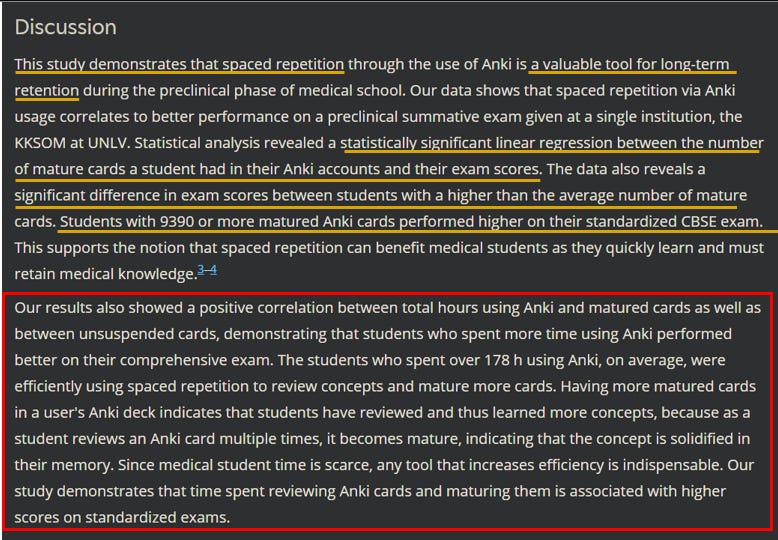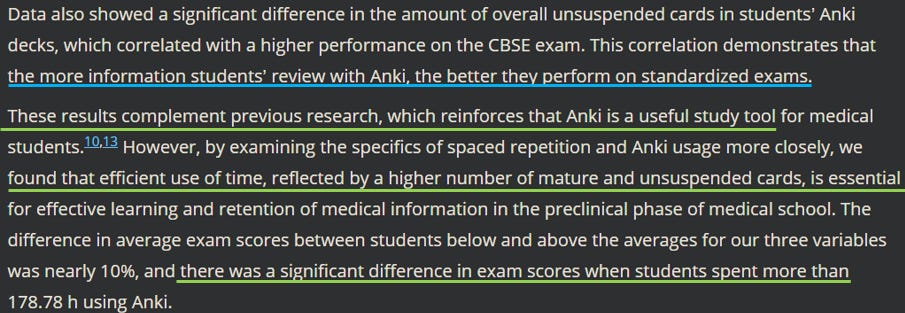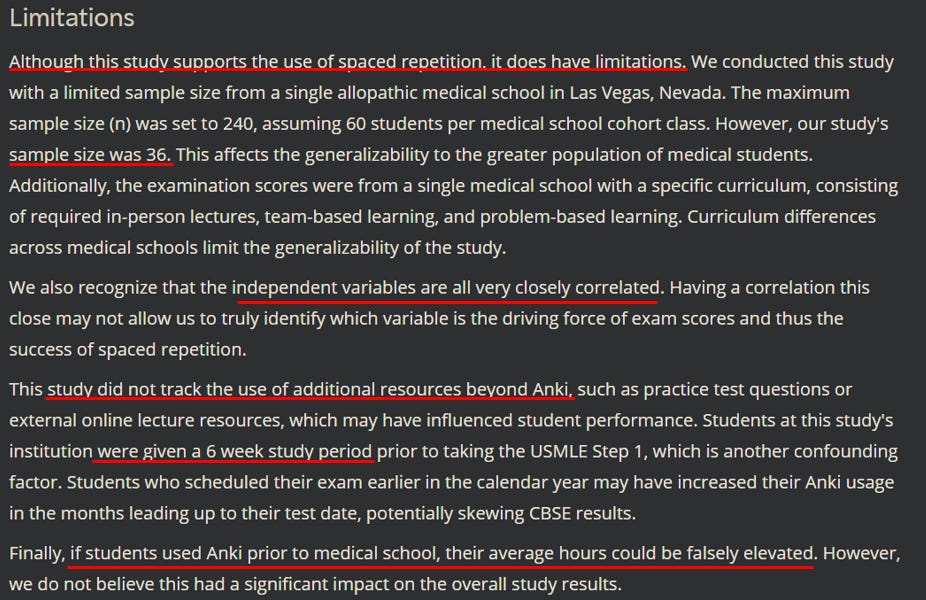If you are only interested in the Shaeda beta release (and not on research), I have created a separate category on my Substack that you can unsubscribe to. To do so, scroll to the bottom of this email, click “Unsubscribe”, and toggle just ‘Research Updates’ off. That said, a lot of time goes into writing up these research-based posts (this one was ~6 hours - I must be a slow typer), so hopefully they’re of interest and value to some - most probably parents and current students (of any age).
TLDR Study 1:
90 final-year undergraduate medical students were randomly split into two groups over 6 months: one group will use Flashcards, and the other will carry on with ‘Traditional Study’
Both groups began the study with the same knowledge levels (potentially slightly higher in the Traditional Study group)
After 6 months, the Flashcard students test performance improved significantly, while the traditional group’s did not improve virtually at all.
Over 90% of students in the Flashcard group reported better retention, engagement, and confidence, with ~65% saying that they felt so “very strongly”.
TLDR Study 2:
This was an observational study (researchers watched from afar) looking at 36 medical students who were already using flashcards
Mature cards (cards that have a long gap [interval] due to repeated success in consistently recalling) were the strongest predictor of exam performance (knowledge)
High flashcard users (users that had amassed ≥9,390 mature cards) scored 71.5%
Low users (<9,390 mature cards) scored 60.0%
~10 percentage point difference between high and low users
Overall, students averaged ~179 hours on flashcards over the study period (6 weeks)
Shaeda Update:
Work is still ongoing to make it as good as possible (Again, within reason. There is no large full-time PhD team working on it, just me and a Web Developer)
The app is not being vibe-coded with AI as I plan on maintaining and improving it for a long time. This means that things need to be set up properly in a way that will allow for smooth updates in the future. This means that it takes longer. And that means that more care will have gone into the app to make it as good as possible.
I’m looking for around ~5-10 people to test an early early version (language learning, academic study, or both). If you are interested in this, please reply to this email and I will be back in touch very soon. All I ask is that you do give feedback, good or bad.
Substack Stuff:
Sorry to be that guy, but Likes and Shares help immensely with getting these emails to all subscribers. Still only around ~55% of subscribers get these emails into their inbox. Substack tell me that the way to increase this is to get more interaction on posts.
If you find this an interesting and valuable read, please consider liking and sharing with someone who you feel may also find value in it - and also in Shaeda.
In the post below, I have highlighted key sections in different colours and occasionally provided some commentary below certain parts using the same colours. I believe this has improved readability.
I’ve a slight background in Statistics, but I am not a professional. If you spot an error in any of my interpretations, please feel free to get in touch and I will happily update and credit.
A couple of months ago, we covered some research on what effective studying looks like (according to a lot of research) and whether or not flashcards are effective. You can take a look here.
Since then, more research has came out that has tried to explore this further.
This will be a quick blog post that goes into these new studies. It will follow a similar structure to the previous blog post in that I will take screenshots, highlight relevant sections, and commenting where I feel potentially relevant.
Both papers are open-access, and are linked and cited below.
Study 1:
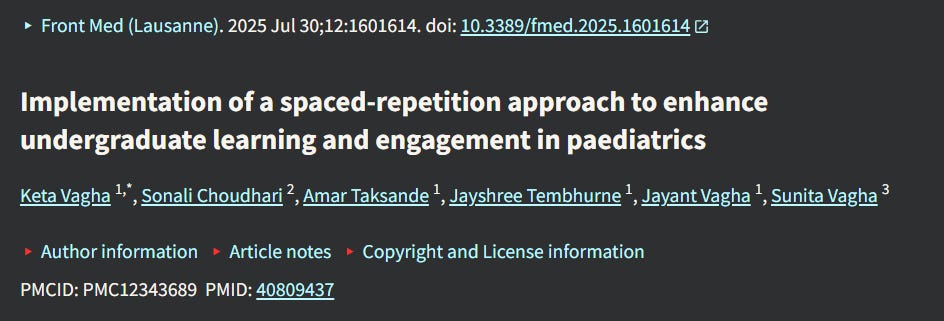
Notes on Method
Notes on Results
Now let’s get into the bulk of the paper. Feel free to scroll past all this if you’ve seen enough and would like to see about study two.
Some Quick Thoughts on “challenges such as time constraints and inconsistent adherence”
Some Notes:
The flashcards were custom made by senior staff, professors, or postgraduate students.
This is why all subjects and languages on Shaeda have undergone validation and is part of what, I believe, will separate Shaeda (as an ‘AI-Flashcard’ application) from the rest in this competitive space.
(Although per the previous blog, a custom/DIY flashcard feature will also be added into Shaeda as well.
For info on what ‘validation’ looks like (or rather, what it results in), see below:
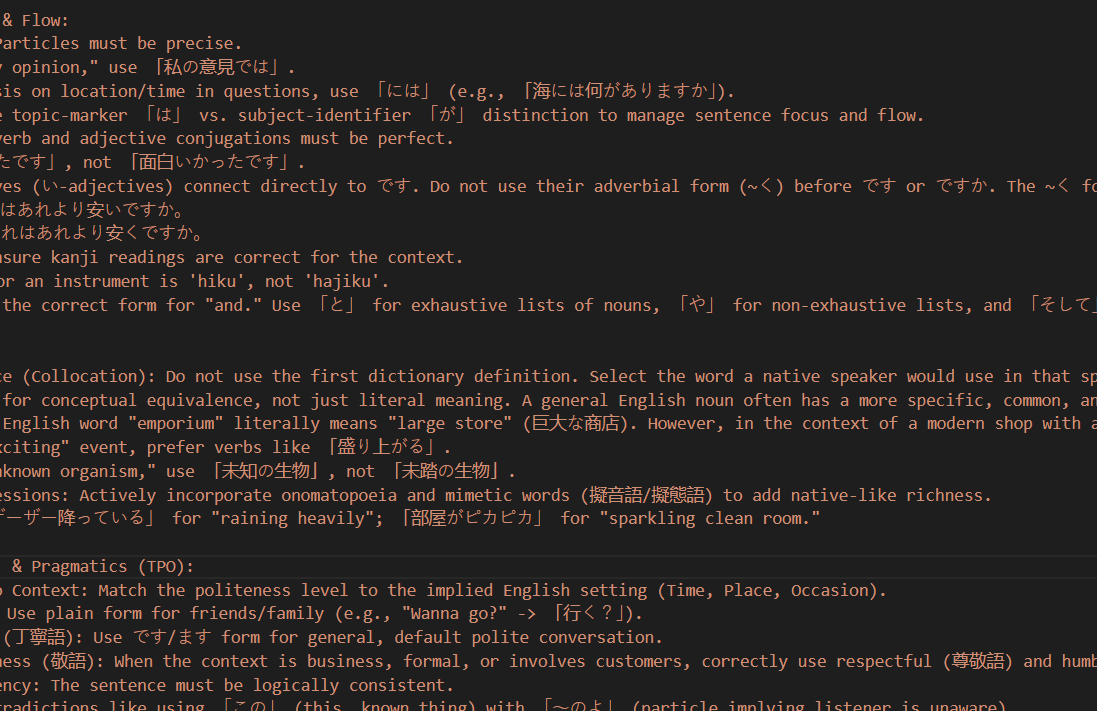
Part of the the Japanese-specific prompt. With a generic prompt, accuracy in Japanese was only about 90% according to native testers. This is due, in part, to Japanese’s vast structural differences from English. Through much iteration and feedback, the native testers identified the recurring problem areas which were then addressed in the prompt. The result is that the Japanese is now, according to them, significantly improved and perfectly appropriate to use for learning. This refinement process applies across all languages and subjects. Consider whether your current AI flashcard app has undergone this level of rigorous (and costly) behind-the-scenes testing.
As I’ve already touched on before, though, there is always a trade-off with everything in life. That is, yes, custom-made flashcards from 1:1 tutoring with a tutor will result in pitch-perfect cards, with perfect audio (for language learning), or perfect examples/explanations (for academic learning). Whether this translates, however, into better knowledge and retention is another question.
It will also, naturally, cost significantly more - along with being a much slower process of obtaining new cards. This is the trade-off. Unfortunately, there’s no such thing as a free lunch.
Study 2:

Quick Thoughts on Table 5
Other Potential Limitations
No baseline knowledge assessment
Students may have entered with vastly different foundational knowledge, making it impossible to isolate Anki's effect from prior learning
No control for baseline study skills:
Students with better existing study habits might naturally gravitate toward systematic tools like Anki
This blog ended up being longer than I planned - apologies!
Reminder of the Shaeda update: work is still ongoing, and I am looking for ~5-10 more people to test an early early version. If you are interested, please get in touch by replying to this email.
Another small reminder (sorry) that Likes and Shares are hugely appreciated as it improves the ‘health’ of the Substack, meaning more people who subscribed will actually receive the emails in their inbox - as opposed to their spam.
Thanks for reading.
Citations:
Vagha, K., Choudhari, S., Taksande, A., Tembhurne, J., Vagha, J., & Vagha, S. (2025). Implementation of a spaced-repetition approach to enhance undergraduate learning and engagement in paediatrics. Frontiers in medicine, 12, 1601614. https://doi.org/10.3389/fmed.2025.1601614
Winter, V., Ames, E., Jacobs, M., Georges, C., & Simanton, E. (2025). Exploring the Impact of Spaced Repetition Through Anki Usage on Preclinical Exam Performance. Journal of Medical Education and Curricular Development, 12. https://doi.org/10.1177/23821205251369705 (Original work published 2025)


